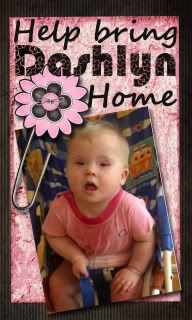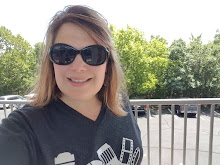You may have seen over here that we were recently scheduled to do a demo for a feeding therapy seminar that was held nearby. Well that was today, and it was quite an experience. A good experience, and yet one that leads to frustration… let me explain.
Lori Overland, MS, CCC-SLP was the speaker, and the seminar was promoted by Leaps and Bounds, which is a therapy facility here. We were to fill in where there was a need for a child with problems moving food around and maintaining liquids in the mouth. What a good fit! I was anxious that Braska might not cooperate in a group setting, but we went ahead and said we’d do it.
We arrived a few minutes early, Braska got to meet Lori and play with her a bit while Lori did some visual eval and observed for a few specific things. She tried a couple skills with her and shared some initial thoughts. Immediately, she noted problems with Braska’s oral motor skill and strength. This might not be a shocker to some of you, but the difference is that she pointed out things that we’ve not had anyone else mention before, or at least recently. I had told her that we’d been led to believe that Braska’s issues were behavioral at this point, her refusal to eat being just that—refusing. We haven’t worked on oral motor skills in over 18 months with any real intention, either in therapy or in general. I always believed that since her speech is so good, and she can make all her sounds correctly, that her oral motor was not the biggest problem. She is able to take food in and swallow it with no problem, so I just operated on the idea that she could eat if she wanted. I know she can’t chew, she never has, so I figured we’d need specific work on that, but I wasn’t sure where to get it.
In less than 15 minutes of observing and working with Braska, she noted and explained numerous things that were “obvious” and pointed toward specific therapy needs. I was relieved to know that there was something that could be done to help her, but I was amazed that we’ve not heard this from other therapists who worked with her quite a while.
We put Braska in her feeding chair, and Lori began to do the demonstration for 65 or so OTs and SLPs who were in attendance. She tried a variety of things, like massage and vibration, to stimulate Braska’s mouth and face and prepare it for feeding. Braska did pretty well overall, and she accepted this interaction better than I would have expected. She didn’t like the alligator jiggler as much as she used to back in the day, but for the most part, she cooperated. She did not want to bite things when asked, like the chewy tube, but that wasn’t really a surprise.
Lori tried to work on the inside of her mouth, on her tongue and cheeks, but Braska was not really having that. Again, this isn’t new for her to avoid that type of thing. I fed her some yogurt while the whole group watched and commented or asked questions. Lori showed what things were indicating issues. The position of her jaw, the way she led with her tongue instead of her lip, the way the top lip stayed up instead of coming down to meet the spoon properly. She also noted things like how long it took Braska to swallow, I guess meaning that she had to work hard to get the food or liquid back there. She also offered her some water in a honey bear, but Braska was not really interested in that so much. She wouldn’t really open her mouth.
Braska is so finicky about who she will warm up to when it comes to working on feeding or around her mouth. She is very quick to shut down around several therapists we’ve had, and it was amazing to me to see how well she did with Lori. I really wish she didn’t live and practice in Connecticut!
We are proud of how Braska has done with her speech and language. She does extremely well for a child her age with DS in the area of speech and language. But Lori pointed out that, though she is speaking very well, she could be even MORE clear and proper in her speech if we could work on these oral motor concerns.
Lori also felt that some of her feeding issues, at least currently, could be due to her ears and enlarged tonsils and adenoids(T&A). I’ve heard from other parents who found that after their child had the T&A removed due to sleep apnea concerns their child also showed improvement in her feeding issues also. Lori felt due to Braska’s noise respiration and apneic episodes that she’s having more frequently that she probably would show progress after the T&A were removed. Braska is scheduled for a sleep study on 3/23 at which time the decision will be made about if they will take out her T&A at the same time that they put in her ear tubes. The combination of these things will likely bring positive results to the feeding situation. She also noted that it might be related to her tendency to sit with her head back, chin up, so frequently. This could possibly be a position that allows for the most open airway. We’ll see what the sleep study shows and go from there, but it’s encouraging to think that we might be on to something that could really make a difference.
As we left, I was happy that we’d found a direction to take to help Braska, and at the same time, I was really kind of mad that we’ve gone this long without this being stressed as important. How have we had all these professionals in and out of our home and involved in her transition and evaluations and no one brought up that she needed focused oral motor therapy?? Now that we’re out of First Steps (EI), this will be all on us to take care of. Insurance doesn’t cover it unless there is a medical diagnosis, and I don’t know that we’ll have a valid one right now. So if we seek private therapy to correct the bad habits and learn the proper ones, it will all be out of pocket. If that’s what we need to do, we will do it. Money will not be the reason she doesn’t learn to eat properly. I’m just frustrated that we’ve gone this long operating on flawed assumptions.
Where do we go from here? Well, we start tomorrow by talking to the school and making some changes to ensure that the right people are working with her. The good news is that there is someone who knows what to do and who Braska likes very well. The bad news is that there is a policy in place that makes it hard for us to be able to have her work with Braska. But I think we can work around it or run right through it. If all else fails, we can see this person outside of school in her private practice, and that’s what we’ll do if we need to. That’s where we’ll start… it’s going to be a long road, but at least we now know where we’re headed.






















